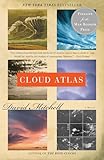 I read Cloud Atlas with two contradictory impulses: first to let loose a yodel, dance a fandango, wrestle an alligator, seize strangers by the hair and hold them firmly until they, too, read this shockingly beautiful Matryoshka doll of a book; second, to pout alone in the darkness under my desk. My first reaction was as a dazzled reader who saw each movement of the book as David Mitchell one-upping himself with his genre-bending (historical, mystery, science fiction), his sublime prose, his broad and breathtaking ideas. The other was as a writer who was intimidated almost to petrification by the mere idea that such a book exists and was written by someone of my generation. It is hard not to make sweeping pronouncements after having lived this book, and, still under its spell three years after I read it, I would say: yes, yes, yes, this is the way novels should be written, with such electric ambition, with such exhilarating sweep.
I read Cloud Atlas with two contradictory impulses: first to let loose a yodel, dance a fandango, wrestle an alligator, seize strangers by the hair and hold them firmly until they, too, read this shockingly beautiful Matryoshka doll of a book; second, to pout alone in the darkness under my desk. My first reaction was as a dazzled reader who saw each movement of the book as David Mitchell one-upping himself with his genre-bending (historical, mystery, science fiction), his sublime prose, his broad and breathtaking ideas. The other was as a writer who was intimidated almost to petrification by the mere idea that such a book exists and was written by someone of my generation. It is hard not to make sweeping pronouncements after having lived this book, and, still under its spell three years after I read it, I would say: yes, yes, yes, this is the way novels should be written, with such electric ambition, with such exhilarating sweep.
Read an excerpt from Cloud Atlas.
More Best Fiction of the Millennium (So Far)
Best of the Millennium, Pros Versus Readers








